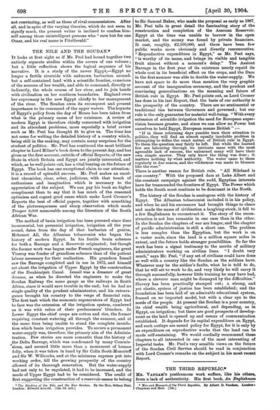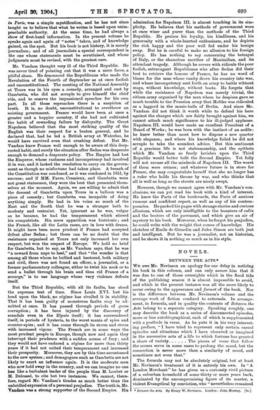Men and Manners of the Third Republic. By Albert D.
Vandam. London s Chapman and Hall. [128.] in Paris, was a simple mystification, and he has not since taught us to believe that what he writes is based upon unim- peachable authority. At the same time, he had always a show of first-hand information. In the present volume he speaks again and again of " notes " taken, and of knowledge gained, on the spot. But his book is not history, it is merely journalism ; and of all journalists a special correspondent is the one whose statements must be scrutinised, and whose judgments must be revised, with the greatest care.
Mr. Vandam thought very ill of the Third Republic. He was never tired of pointing out that it was a mere farce, a pitiful sham. He denounced the Republicans who made the Revolution of the Fourth of September as at once foolish and unconstitutional. The meeting of the National Assembly at Tours was in his eyes a comedy, arranged and cast by Gambetta, who did not scruple to give himself the chief role, and to reserve the impassioned speeches for his own part. In all these reproaches there is a suspicion of truth. It is, no doubt, unconstitutional to overthrow an existing government. France would have been at once a greater and a happier country, if she had not cultivated the habit of rewarding failure by disloyalty. The Great Napoleon believed that the most striking quality of the English was their respect for a beaten general, and he declared that, had he led a British army at Waterloo, he would have survived even that crushing defeat. But Mr. Vandam knew France well enough to be aware of this deep- rooted habit, and surely the situation after Sedan was desperate enough to demand a desperate policy. The Empire had lost the Emperor, whose rashness and incompetency had involved it in war, and it lacked the resolution to carry on the govern- ment as though no misfortune had taken place. A breach of the Constitution was condoned, as it was condoned in 1851, by success; and if MM. Favre, Cremieux, and Gambetta were not great statesmen, they were the best that presented them- selves at the moment. Again, we are willing to admit that the descent of Gambetta upon Tours in a balloon was a piece of comedy ; but Gambetta was incapable of doing anything simply. He had in his veins so much of the East and the South that he was a stranger both to modesty and restraint. Yet, ignorant as he was, vulgar as be became, he had the temperament which stirred his compatriots. His mere apparition was histrionic ; and the French, like all the Latin races, are in love with drama. It might have been more prudent if France had accepted defeat after Sedan ; but there can be no doubt that the resistance organised at Tours not only increased her own respect, but won the respect of Europe. We hold no brief for Gambetta, but to say, as Mr. Vandam says, that he was "a coward from nape to heel," and that "the wonder is that among all those whom he bullied and hectored, both military and civil, there was not found an officer, a journalist, or a former parliamentary colleague, either to twist his neck or to send a bullet through his brain and thus rid France of a scourge," is to use language whose very violence defeats itself.
But the Third Republic, with all its faults, has stood the supreme test of time. Since Louis XVI. lost his head upon the block, no regime has rivalled it in stability. That it has been guilty of monstrous faults may be ad- tnitted at once. It has passed through periods of gross corruption ; it has been injured by the discovery of scandals even in the Elysee itself; it has surrrendered itself, in periods of hysteria, to the worst mania of spies and counter-spies ; and it has come through its storm and stress with increased vigour. The French are in some ways the most prudent people in Europe, though now and again they interrupt their prudence with a sudden access of fury ; and they would not have endured a regime for more than thirty years if it had not suited their temperament and increased their prosperity. Moreover, they are by this time accustomed to the new system; and demagogues such as Gambetta are not likely to exert an influence again. It is the moderate men who now hold sway in the country, and we can imagine no one less like a turbulent leader of the people than M. Loubet or M. Delcasse, to cite but two instances. We cannot, there- fore, regard Mr. Vandam's tirades as much better than the unbridled expression of a personal prejudice. The truth is, Mr. Vandam was a strong supporter of the Second Empire. His
admiration for Napoleon III. is almost touching in its aim. plicity. He believes that his methods of government were at once wiser and purer than the methods of the Third Republic. He praises his loyalty, his kindliness, and his generosity with a whole-hearted enthusiasm, and he depicts the rich happy and the poor well fed under his benign sway. But he is careful to make no allusion to his foreign policy. He has nothing to say concerning the betrayal of Italy, or the shameless sacrifice of Maximilian, and its attendant tragedy. Although he covers with ridicule the poor foolish, extravagant Republicans who after Sedan did their best to retrieve the honour of France, he has no word of blame for the man whose vanity drove his country into war, and whose incompetency sent forth an army to battle without maps, without knowledge, without boots. He forgets that while the resistance of Napoleon was merely trivial, the citizen army organised by the men whom he despises gave so much trouble to the Prussian army that Moltke was ridiculed as a laggard in the music-halls of Berlin. And since Mr. Vandam did not think it worth while to defend his hero against the charges which are fairly brought against him, we cannot attach much significance to his ill-judged applause. Napoleon III, would have made an excellent President of a Board of Works ; he was born with the instinct of an aedile : he knew better than most how to dispose a new quarter with elegance; and where his knowledge failed he did not scruple to take the soundest advice. • But this sentiment of a gracious life is not statesmanship, and the epithets which Mr. Vandam so freely lavishes upon the Third Republic would better befit the Second Empire. Yet folly will not excuse all the misdeeds of Napoleon III. The worst of them were crimes; and whatever future is in store for France, she may congratulate herself that she no longer has a ruler who holds his throne by war, and who thinks that all is well BO long as the streets are nicely swept.
However, though we cannot agree with Mr. Vandam's con- clusions, we can yet read his book with a kind of interest. He knew the Paris of the boulevards, the Paris of anxious rumour and confident report, as well as any of his contem- poraries. He packed his pages with strange stories and curious allusions, which are only intelligible to the haunters of cafés and the beaters of the pavement, and which give an air of mystery to his book. Moreover, when he forgot his prejudice, he could write with the weight that comes of knowledge. His sketches of Emile de Girardin and Jules Simon are both just and intelligent. But he was a journalist, not an historian, and he shows it in nothing so much as in his style.























































 Previous page
Previous page